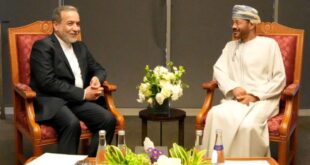ST. PETERSBURG (AP) — Group of Eight (G-8) leaders were told Iran was seriously considering a package of incentives aimed at getting it to halt its nuclear programme, South African President Thabo Mbeki said Monday.
Mbeki, whose Foreign Minister Nkosazana Dlamini Zuma visited Iran last week, said he passed on that message during his meetings with the leaders in Russia. An Iranian foreign ministry official made similar comments to reporters Sunday, but Mbeki’s briefing took the communications to a higher level. “We have today in our interactions with the G-8 communicated the essential message from the Iranians,†Mbeki said in an interview with foreign reporters. “It is that they believe this proposal is important, it constitutes an important starting point with regard to the negotiating process which everybody agrees needs to take place, and therefore that they are considering the matter seriously.â€
The package the United States, Britain, China, France, Russia and Germany offered last month includes economic incentives and a provision for the United States to offer Iran some nuclear technology, lift some sanctions and join direct negotiations. The key demand of the six is that Iran stop enriching uranium during any negotiations. Their proposal also calls for Iran to impose a long-term moratorium on uranium enrichment — which can produce civilian reactor fuel or fissile bomb material.
Iran, facing UN Security Council sanction, has said it will formally respond in late August. Iranian foreign ministry spokesman Hamid Reza Asefi told reporters in Tehran Sunday that the proposals were an “acceptable basis†for talks, and that Iran was ready for detailed negotiations.
Frustrated world powers agreed Wednesday to send Iran to the UN Security Council for possible punishment, saying Tehran had given no sign it would bargain in earnest over its nuclear ambitions.
The United States and some of its allies accuse Iran of seeking nuclear weapons. Tehran has denied the charges, saying its programme is aimed at making electricity, not bombs.
South Africa built six nuclear weapons and partially assembled a seventh between the 1970s and 1993, then renounced nuclear weapons and dismantled its arsenal. That history gives it moral authority in the debate over disarmament, and it also is a powerful advocate for the right of developing countries to have access to nuclear technology for peaceful purposes.
On other matters, Mbeki said he was satisfied with the G-8’s position on stepping up the fight against infectious diseases.
“It’s a detailed statement, which I think is what is required, and makes various specific commitments even to the individual countries,†he said, adding that he was especially satisfied that new attention is being directed to improving African countries’ health systems in general.
“You may very well provide drugs and medicines and this kind of thing but if your health infrastructures are weak and you don’t have the health personnel for instance then indeed you’re not going to make much progress. So I think that was one of the important decisions that was taken — that there must be also focus on the matter of those health systems, which would include the training deployment and retention of health personnel,†Mbeki said.
Mbeki’s government continues to draw criticism for what is seen as its sluggish implementation of a plan to provide free AIDS treatment to all who need it and its mixed messages about HIV, the virus that causes AIDS.
Also Monday, the South African leader said the G-8 meeting included discussion of the fighting in the Darfur region of Sudan, and that all parties agreed that a United Nations peacekeeping mission was essential. Sudan has so far opposed a UN force.
For the time being, Mbeki said, an undermanned, underfunded African Union mission now in Darfur “would need to stay there as presently constituted.†He called for discussions on funding the hard-pressed mission.
 Eurasia Press & News
Eurasia Press & News



